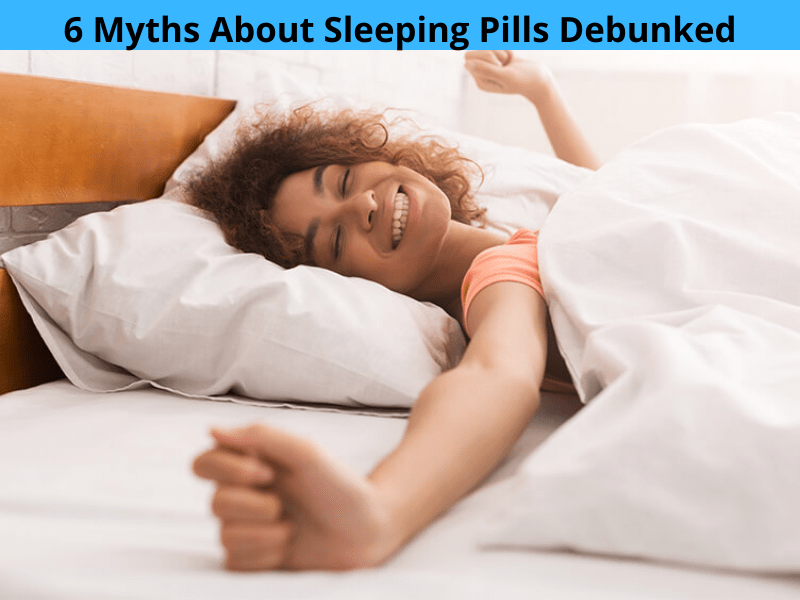For hundreds of years, scientists have been fascinated with sleep. Despite being one of the most researched areas of human behavior, we still only know a small lot about how and why people sleep.
Are you facing trouble sleeping? Buy Zopiclone 7.5 mg tablets UK, a sleeping pill to help you get some rest? Despite this, hundreds of sleep myths continue, ranging from the greatest foods to eat before bed to the ideal quantity of sleep every night. Many of the most frequent sleep misconceptions are not only erroneous but completely incorrect.
The ten most frequent sleep myths have been debunked in this blog post. Continue reading to learn the reality behind 10 common sleep-related myths that you may still believe
Waking Up At Night Is Unhealthy
Have you ever awoken in the middle of the night for no apparent reason? Most individuals are concerned that waking up in the middle of the night would make them weary and sluggish the next day.
This isn’t entirely accurate. Waking up in the middle of the night is a common occurrence in many people’s sleep cycles, and it’s a trait shared by many animals.
In fact, waking up in the middle of the night may be better for your health than sleeping for eight hours straight. People who followed a sleep regimen based on natural light exposure slept for two three-to-five hour stints with a one-hour break during the night and reported never feeling more refreshed, according to Thomas Wehr, M.D.
When You Sleep, Your Brain Rests
Because your brain works so hard during the day, it’s only natural that it would relax while you sleep. That is not the case. Your brain continues busy throughout the night. It’s actually more active when you’re sleeping than when you’re up, according to certain measures.
Sleep is divided into numerous stages, each of which has a different impact on the degree of activity in your brain.
You Need At Least Eight Hours Per Night:
The conventional eight-hours-a-night rule, according to sleep expert Daniel Kripke, isn’t as precise as we once thought. Kripke discovered that short sleepers who needed 6.5 to 7.5 hours per night were really more productive than long sleepers in a recent study.
While Kripke’s study indicated that shorter sleep durations are optimal, science remains divided on the appropriate time for adults to sleep. Jim Horne, a sleep expert, believes that everyone benefits from varying amounts of sleep, and that six hours of sleep may be ideal for one individual while 10 hours may be required for another.
You Can Make Up For Lost Sleep the Next Night
Have you ever remained up until the wee hours of the morning studying for an exam? It’s easy to believe that sleeping an extra hour or two the next night will compensate for missing sleep, but sleep experts aren’t convinced.
Dr. Raghu Reddy of the University of Arkansas believes that while a few hours of lost sleep can be compensated for, more than 20 hours each week cannot be regained, regardless of how long you spend in bed on the weekend.
While staying up late researching may appear to be a successful technique, getting the same amount of sleep each night and preparing for your test ahead of time without interrupting your normal sleep schedule is more preferable.
A Glass of Wine Always Cures Insomnia
While a glass of wine late at night may help you fall asleep, it does nothing for the quality of your sleep. While drinking alcohol before bed can improve your slow-wave sleep, it can also disrupt your REM sleep, leaving you weary in the morning.
Drinking alcohol before bedtime has been shown to disturb sleep in women more than in males. Because women metabolize alcohol faster than men, they miss out on the sedative benefits and find themselves tossing and turning after only a few glasses of red wine.
Sleep Medication Is Risk-Free
Do you have insomnia? While hormonal sleep aids such as melatonin make it easier to fall asleep at night, taking them too regularly might have major health consequences.
Melatonin has modest adverse effects, but heavier sleeping drugs, such as diazepam (a commonly prescribed benzodiazepine prescription used to treat insomnia and anxiety), can cause depression, hypotension, and significant psychological dependence if used excessively.
Instead of taking medicine to treat insomnia, try natural remedies such as taking a warm bath before bed or changing your current mattress with a bespoke mattress for added comfort.
Buy Sleeping Pills UK is the Best Option to Buy Sleeping tablets in UK within one day delivery







